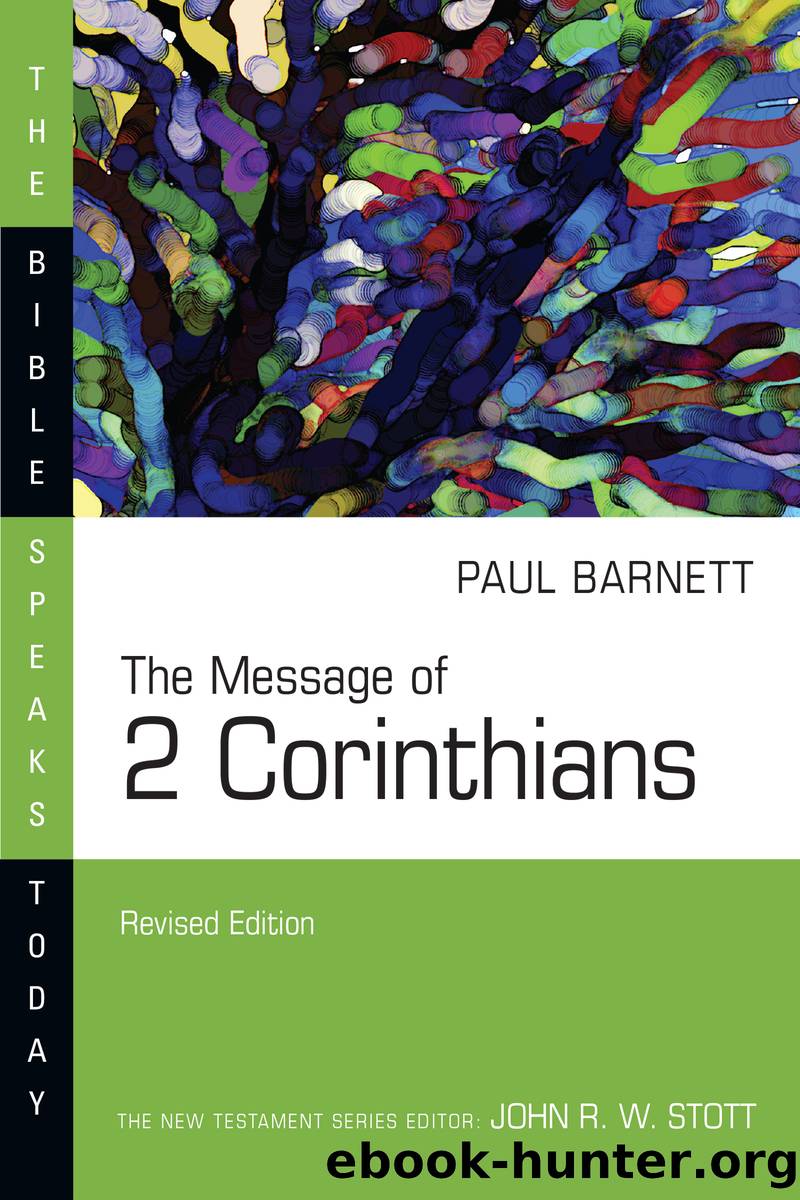The Message of 2 Corinthians by Paul Barnett;

Author:Paul Barnett;
Language: eng
Format: epub
ISBN: 9780830817405
Publisher: Inter-Varsity Press
Published: 2020-10-19T00:00:00+00:00
1.âPaulâs ministry: a basis for pride (5:11â13)
Paulâs allusion to those who take pride (12) brings the newcomers into focus once more.1 In what do they take pride? It is in what is seen, their position (literally, âfaceâ, prosoÌpon, 12), which Paul explains as being out of their mind (13; cf. Mark 3:21), a reference to their ecstatic behaviour. It seems that the new ministers were seeking recognition on the basis of bizarre religious trances or gibberish, doubtless as a sign of their inspiration by God.
Paulâs admission If we are âout of our mindâ (13) is written to anticipate a possible rejoinder from the Corinthians that Paul also was in this condition. Did he not âspeak in tongues more than allâ of them (1 Cor. 14:18)? Surely Paul too, by his tongues-speaking, was trying to legitimize his ministry by means of position or âappearanceâ â the very thing he complains the newcomers are doing. Paulâs reply is that his glossolalia is something private; it is for God alone, presumably as an expression of personal devotion. It is not done to support his apostolic claims.
For you, however, he tells the Corinthians, we are in our right mind (or âself-controlledâ, 13). Käsemann comments that âthe realm of private religious life . . . is marked off from the realm of apostolic service to the community, which is described . . . as being of sound mindâ.2
Nevertheless the Corinthians need to be able to say something in defence of Paul. It would be helpful if there were some quality or achievement about which they might express confidence in him. The opportunity (12) for which they should take pride in Paul, he tells them, is that he persuades people (11),3 that is, he engages in evangelism (20). It is the âministryâ therefore, and his faithfulness to it, which are to be the basis of Corinthian confidence in Paul. This source of pride in Paul is not something esoteric or bizarre; his ministry, being public, is plain to the Corinthiansâ conscience just as Paul himself is plain to God (11). Mystic experience or ecstatic behaviour in ministers, therefore, should play no part in their recognition or accreditation, though such things may validly belong to their private world of relationship with God. What matters is that the would-be minister is active in âpersuadingâ others to become Christians and that he or she does so in a âself-controlledâ way in the public exercise of ministry.
If the object of persuading people was that they might be âreconciled to Godâ (20), his motive for doing so was the fear of the Lord (11), the fear, as the previous verse stated, that âwe must all appear before the judgment seat of Christâ. To stand before the Lord Christ seated on his throne of judgment is indeed a fearful thing, but for whom? Paul or the people he sought to persuade? It is quite probable that he was thinking of the judgment of both sinners and the servants of the Lord. Paul
Download
This site does not store any files on its server. We only index and link to content provided by other sites. Please contact the content providers to delete copyright contents if any and email us, we'll remove relevant links or contents immediately.
Machine Learning at Scale with H2O by Gregory Keys | David Whiting(3653)
Never by Ken Follett(3542)
Fairy Tale by Stephen King(2960)
The Man Who Died Twice by Richard Osman(2818)
Reminders of Him: A Novel by Colleen Hoover(2779)
Will by Will Smith(2588)
Rationality by Steven Pinker(2155)
It Starts With Us (It Ends with Us #2) by Colleen Hoover(2049)
Friends, Lovers, and the Big Terrible Thing by Matthew Perry(2011)
Can't Hurt Me: Master Your Mind and Defy the Odds - Clean Edition by David Goggins(2007)
The Stranger in the Lifeboat by Mitch Albom(1941)
The Becoming by Nora Roberts(1925)
Love on the Brain by Ali Hazelwood(1824)
New Morning Mercies: A Daily Gospel Devotional by Paul David Tripp(1814)
HBR's 10 Must Reads 2022 by Harvard Business Review(1702)
The Strength In Our Scars by Bianca Sparacino(1701)
A Short History of War by Jeremy Black(1676)
Never Finished: Unshackle Your Mind and Win the War Within by David Goggins(1562)
515945210 by Unknown(1524)
